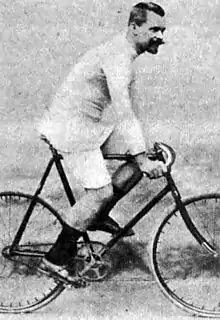1896 Paris–Roubaix
The first edition of Paris–Roubaix, a classic one-day cycle race in France, was held on 19 April 1896. The event covered 280 km (174 mi) from Paris to the velodrome in Roubaix.[1] The winner was German Josef Fischer who received 1.000 francs for the win, a considerable sum of money at the time.[2][3][4] The race, as were all editions until 1909, was motorpaced.[5]
| Race details | ||||||||||
|---|---|---|---|---|---|---|---|---|---|---|
| Dates | 19 April 1896 | |||||||||
| Stages | 1 | |||||||||
| Distance | 280 km (174.0 mi) | |||||||||
| Winning time | 9h 17' 00" | |||||||||
| Results | ||||||||||
| ||||||||||
Origin
The race was created by two Roubaix textile manufacturers, Théodore Vienne and Maurice Perez, who had built a velodrome in Roubaix and wished to promote the track.[6] Before its first running, it was first presented to the sponsor, Le Vélo, as a training race for the then well-established, now defunct, Bordeaux–Paris.[3][7] As Roubaix was a small provincial town at the time, a professional bike race finishing there would be very good for business.
Paul Rousseau, the director of Le Vélo, agreed to start the race outside the paper's offices in Paris. He designed a route and sent out Victor Breyer,[N 1] in order to test the route. Breyer drove to Amiens by car, before continuing by bike the following day. When he reached Roubaix, he was cold and covered in mud. He was miserable enough to suggest the race be called off, but a shower and a meal changed his mind.[8]
Race overview
As many as half the riders who were supposed to ride stayed in bed, including Henri Desgrange, who later organised the first Tour de France. Notably, the winner of that first Tour de France, Maurice Garin, did start the race, finished third and went on to win the following two editions in subsequent years.[7][9]
The race was full of incidents, Welshman Arthur Linton, who finished fourth, crashed six times, once after hitting a dog. The winner, Josef Fischer, had a lead of 23 minutes until he was almost knocked off by a horse and was then halted by cows. When Fischer entered the velodrome in Roubaix he was covered in filth and blood. Only three other riders finished within an hour, all in similar conditions.[8]
Results

| Rank | Cyclist | Time |
|---|---|---|
| 1 | 9h 17' 00″ | |
| 2 | +25' 00″ | |
| 3 | +28' 00″ | |
| 4 | +45' 00″ | |
| 5 | +1h 01' 00″ | |
| 6 | +1h 01' 50″ | |
| 7 | +1h 07' 50″ | |
| 8 | +1h 43' 00″ | |
| 9 | +2h 02' 00″ | |
| 10 | +2h 16' 00″ | |
| Final results (11–26)[10] | |||
|---|---|---|---|
| Rank | Cyclist | Time | |
| 11 | +2h 29' 00″ | ||
| 12 | +2h 44' 00″ | ||
| 13 | +4h 03' 00″ | ||
| 14 | +4h 05' 00″ | ||
| 15 | +4h 16' 00″ | ||
| 16 | +4h 17' 00″ | ||
| 17 | +4h 22' 00″ | ||
| 18 | +5h 22' 00″ | ||
| 19 | +6h 01' 00″ | ||
| 20 | +7h 23' 00″ | ||
| 21 | +8h 01' 00″ | ||
| 22 | +8h 02' 00″ | ||
| 23 | s.t. | ||
| 24 | +8h 11' 00″ | ||
| 25 | +8h 39' 00″ | ||
| 26 | s.t. | ||
| 27 | s.t. | ||
| 28 | s.t. | ||
Footnotes
- the man who stood at the top of the Tourmalet in 1910 and was called a "murderer" by a rider
References
- "Vélocipédie". Le Petit journal (in French). Gallica Bibliothèque Numérique. 19 April 1896. p. 3. Retrieved 16 March 2010.
- "Vélocipédie". Le Petit journal (in French). Gallica Bibliothèque Numérique. 20 April 1896. p. 3. Retrieved 16 March 2010.
- Janna Trevisanut (9 April 2004). "102nd Paris Roubaix Preview". Le Tour de France. Amaury Sport Organisation. Archived from the original on 20 September 2007. Retrieved 11 April 2013.
- "Race winners since 1896". Le Tour de France. Amaury Sport Organisation. Archived from the original on 10 April 2013. Retrieved 11 April 2013.
- Lionel Birnie (9 April 2004). "Paris-Roubaix preview". Cycling Weekly. IPC Media. Retrieved 11 April 2008.
- Sergent, Pascal (1989). Chronique d'une légende: Paris–Roubaix. Chronique d'une Légende. 1. Flandria Nostra. pp. 13–18.
- Staff (10 April 2009). "Paris–Roubaix - A History". Daily Peloton. Info Média Conseil Inc. Archived from the original on 2012-02-23. Retrieved 11 August 2011.
- "The real Hell of the North". Cyclingnews.com. Bath, UK: Future plc. 2004-04-18. Retrieved 2012-09-26.
- "Podiums Paris roubaix Pro" Archived 2011-07-13 at the Wayback Machine (French) lesamisdeparisroubaix.com Retrieved 2010-02-21
- "Cycling - Paris–Roubaix - 1896". The-Sports.org. Info Média Conseil Inc. Retrieved 11 August 2011.